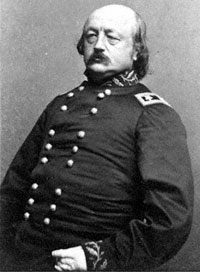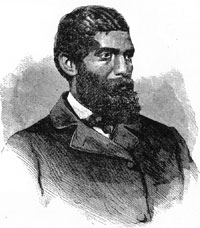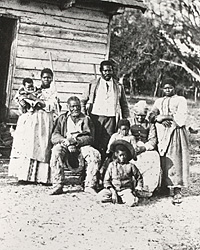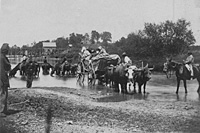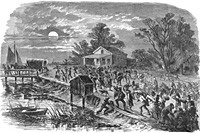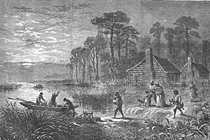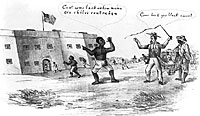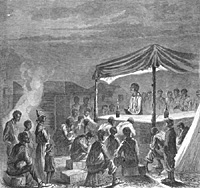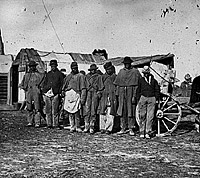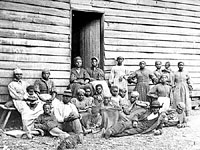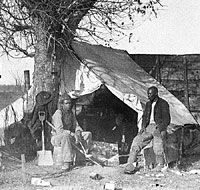The status of blacks who escaped servitude was not obvious or clear at the beginning of the Civil War. Lincoln biographer Noah Brooks wrote how escaped slaves were treated in the early weeks of the Civil War in 1861: “The slaves of the South were thought by the people of that region to be an element of strength. The slaveholders relied on the faithful attachment of these unfortunate creatures, a reliance that was seldom misplaced. The slaves had once been taught that the Abolitionists’ were a species of monsters that infested the North and devoured escaped black people. And, so long as they had food and protection from their masters, the bondmen did not leave their masters, even when the war began. They were useful in making preparations for battles, marches, and sieges. They were teamsters, workmen on forts, and diggers of intrenchments. In the eyes of all the people, North and South, the slaves were still property. And it was the custom of most officers of the United States army to give up the few fugitive negroes that came into their lines. Gen. B[enjamin]. F. Butler, however, while in command at Fortress Monroe, Virginia, perceived that the slave were used by the Rebels precisely as horses or mules would have been; they were employed in promoting the efficiency of the Rebel military works. Accordingly, when slaves came into his lines, he refused to give them up, declaring that, like war material, they were ‘contraband of war.’ This was a new idea, and from that time the African slave inside of the Union lines was known as a contraband. The word not only gave a new name to the escaping slave, but it suggested a line of policy that afterwards troubled greatly the warlike slaveholders and the Rebel leaders. They had no longer any power to enforce the law concerning fugitive slaves, about which they had once been much concerned.”1
Benjamin Butler was a Democratic general from Massachusetts who had shown enterprise in getting his regiment quickly to Washington at the beginning of the war but also show a talent for rubbing his military superiors the wrong way. In order to reduce the field of mischief for Butler, he was promoted to Major General and shipped off to Fort Monroe in Virginia to command the grandiosely-titled “Department of Virginia, North and South Carolina.” His orders kept him on a short leash, but he made headlines with his famous decision to treat runaways slaves as ‘contraband of war,” a notion that anticipated by three months the First Confiscation Act,” according to historian Mark Grimsley.2
Historian Ralph R. Fahrney wrote: “During the latter part of May, 1861, General Butler, then in command at Fortress Monroe, issued the first pronouncement concerning the status of slavery in so far as it related to war operations, by declaring that fugitive blacks formerly employed on Confederate fortifications were ‘contraband of war.’ Northern opinion seemed to approve his course and the administration did not see fit to alter it. The Tribune heartily endorsed the procedure, concluding that surely enough ‘negro slaves, belonging to Secessionists and Rebels, are contraband commodities.'”3 In his memoirs, Butler gave any extensive report of how the contraband policy came into existence – and a defense against suggestions by Lincoln aide John Hay that the term “contraband” had been dreamed up by a journalist:
On the day after my arrival at the fort, May 23, three negroes were reported coming in a boat from Sewall’s Point, where the enemy was building a battery. Thinking that some information as to that work might be got from them, I had them before me. I learned that they were employed on the battery on the Point, which as yet was a trifling affair. There were only two guns there, though the work was laid out to be much larger and to be heavily mounted with guns captured from the navy-yard. The negroes said they belonged to Colonel Mallory, who commanded the Virginia troops around Hampton, and that he was now making preparation to take all his negroes to Florida soon, and that not wanting to go away from home they had escaped to the fort. I directed that they should be fed and set at work.
On the next day I was notified by an officer in charge of the picket line next Hampton that an officer bearing a flag of true desired to be admitted to the fort to see me. As I did not wish to allow officers of the enemy to come inside the fort just then and see us piling up sand bags to protect the weak points there, I directed the bearer of the flag to be informed that I would be at the picket line in the course of an hour. Accompanied by two gentlemen of my staff, Major Fay and Captain Haggerty, neither now living, I rode out to the picket line and met the flag of truce there. I was under charge of Major Carey, who introduced himself, at the same time pleasantly calling to mind that we last met at the Charleston [Democratic National] convention. Major Carey opened the conversation by saying: ‘I have sought to see you for the purpose of ascertaining upon what principles you intend to conduct the war in this neighborhood.’ I expressed my willingness to answer, and the major said: ‘I ask first whether a passage through the blockading fleet will be allowed to families and citizens of Virginia who desire to go North to a place of safety.”
“The presence of the families of the belligerents,” I replied, ‘is always the best hostage for their good behavior. One of the objects of the blockade is to prevent the admission of supplies and provisions into Virginia while she is hostile to the government. Reducing the number of consumers would necessarily tend to defeat the object in view. Passing a vessel through the blockade would involve so much trouble and delay, by way of examination to prevent frauds and abuse of the privilege, that I feel myself under necessity of refusing.”
“Will the passage of families desiring to go North be permitted?” asked Major Carey.
“With the exception of an interruption at Baltimore, which has now been disposed of, travel of peaceable citizens through to the North has not been hindered; and as to the internal line through Virginia, your friends have, for the present, entire control of it. The authorities at Washington will settle that question, and I must leave it to be disposed of by them.”
“I am informed,” said Major Carey, “that three negroes belonging to Colonel Mallory have escaped within your lines. I am Colonel Mallory’s agent and have charge of his property. What do you mean to do with those negroes?”
“I intend to hold them,” said I.
“Do you mean, then, to set aside your constitutional obligation to return them?”
“I mean to take Virginia at her word, as declared in the ordinance of secession passed yesterday. I am under no constitutional obligations to a foreign country, which Virginia now claims to be.”
“But you say we cannot secede,’ he answered, ‘and so you cannot consistently detain the negroes.”
“But you say you have seceded, so you cannot consistently claim them. I shall hold these negroes as contraband of war, since they are engaged in the construction of your battery and are claimed as your property. The question is simply whether they shall be used for or against the Government of the United States. Yet, though I greatly need the labor which has providentially come to my hands, if Colonel Mallory will come into the fort and take the oath of allegiance to the United States, he shall have his negroes, and I will endeavor to hire them from him.”
“Colonel Mallory is absent,” was Major Carey’s answer.
We courteously parted. On the way back, ‘the correctness of my law was discussed by Major Haggerty, who was, for a young man, a very good lawyer. He said that he doubted somewhat upon the law, and asked me if I knew of that proposition having been laid down in any treatise on international law.
“Not the precise proposition,” said I; ‘but the precise principle is familiar law. Property of whatever nature, used, or capable of being used for warlike purposes, and especially when being so used, may be captured and held either on sea or on shore as property contraband of war. Whether there may be a property in human beings is a question upon which some of us might doubt, but the rebels cannot take the negative. At any rate, Haggerty, it is a good enough reason to stop the rebels’ mouths with, especially as I should have held these negroes anyway.”
At headquarters and in the fort nothing was discussed but the negro question, and especially this phase of it. The negroes came pouring in day by day, and the third day from that I reported, the fact that more than $50,000 worth of them had come in; that I had found work for them to do, had classified them and made a list of them so that their identity might be fully assured, and had appointed a ‘commissioner of negro affairs’ to take this business off my hands, for it was becoming onerous.
I wrote the lieutenant-general [Winfield Scott] that I awaited instructions but should pursue this course until I had received them. On the 30th I received word from the Secretary of War, to whom I had duplicated my letter to General Scott. His instructions gave me no directions to pursue any different course of action from that which I had reported to him, except that I was to keep an accurate account of the value of their work.
But the local effect of the position taken was of the slightest account compared with its effect upon the country at large. The question of the disposal of the slaves was one that perplexed very many of the most ardent lovers of the country and loyal prosecutors of the war. It afforded a groundwork for discussion which yielded many excuses for those who did not desire the war to be carried on. In a word, the slave question was a stumbling-block.. Everybody saw that if the work of returning fugitive slaves to their masters in rebellion was imposed upon the Union troops, it would never be done; the men would simply be disgusted and finally decline the duty.4
Obviously, such a policy presented complications in border areas, including Washington, D.C., where the distinction between an escaped contraband and a legally enslaved black was not always clear. Furthermore, the practical effect of the contraband policy was to encourage black slaves living near Union lines to flee for the protection of Union soldiers. But that placed a burden on Union generals that they were not prepared to cope with. Historian John Hope Franklin wrote: “In June, 1861, several military officers spoke out in favor of returning all fugitives. In the West, General [Henry W.] Halleck adopted this policy. But the lack of any uniform policy is clearly indicated by two developments in July, 1861. On July 9 the House of Representatives passed a resolution declaring it was no part of the duty of federal troops to capture or return fugitive slaves. One week later, General Winfield Scott wrote brigadier General [Irvin] McDowell, in the name of President Lincoln, asking him to allow owners of fugitive slaves in Virginia to cross the Potomac and recover slaves who had take refuge in Union lines. Small wonder that there was so much dissatisfaction among the abolitionists with regard to federal policy.”5
According to the New York Tribune, General Henry W. Halleck’s “order in November, 1861, barring fugitive slaves from all army camps, had precipitated an avalanche of criticism from Spruce and Nassau Street [in New York City]. The order was denounced as ‘a concession to slavery’ sure to produce an exactly opposite effect from that which it was professed to effect; it indicated plainly enough that the author was ‘fishing for the good opinion of the rebel slaveholders,'”6 That concern extended to Congress. “On December 4 he offered a resolution calling for General [Henry W.] Halleck’s orders in Missouri, which directed that fugitive slaves be not received within the lines, and that those already there should be expelled. In a brief speech he criticised these orders as ‘disheartening to our soldiers,’ ‘irrational and inhuman. There was some hesitancy on the part of our generals in regard to escaped slaves, and Sumner again spoke on the subject in May, urging the folly of protecting slavery while it was attempting to destroy the government. He followed his first speech by a resolution directing the committee on military affairs to consider the expediency of legislation against the surrender of fugitive slaves by our armies. The subject received prompt attention in both Houses, and, after much discussion as to form, a bill was passed by the House adding a new article of war prohibiting the use of the United States forces for the return of fugitive slaves. This passed the Senate, and became a law on March 13, 1862.”7
Historian John Hope Franklin wrote: “As the Union armies pushed into the South and occupied vast stretches of land, Negroes poured into the Union lines by the thousands. Yet federal policy for their relief and employment was hardly more clear-cut than it had been when the legality of receiving them at all was doubtful. Again each commanding officer seemed to use his own discretion. In West Tennessee, General Grant found it necessary to appoint John Eaton to take charge of all fugitives in his area in November, 1862.”8 Grant had already begun putting contrabands to work for his army as teamsters, cooks and hospital workers. In his memoirs, Grant recalled:
It was at this point, probably, where the first idea of a “Freedman’s Bureau” took its origin. Orders of the government prohibited the expulsion of the negroes from the protection of the army, when they cam in voluntarily. Humanity forbade allowing them to starve. With such an array of them, of all ages and both sexes, as had congregated about Grand Junction, amounting to many thousands, it was impossible to advance. There as no special authority for feeding them unless they were employed as teamsters, cooks and pioneers with the army; but only able-bodied young men were suitable for such work. This labor would support but a very limited percentage of them. The plantations were all deserted; the cotton and corn were ripe: men, women and children above ten years of age could be employed in saving these crops. To do this work with contrabands, or have it done, organization under a competent chief was necessary. On inquiring for such a man Chaplain Eaton, now and for many years the very able United States Commissioner of Education, was suggested. He proved as efficient in that field as he has since done in his present one. I gave him all the assistants and guards he called for. We together fixed the prices to be paid for the negro labor, whether rendered to the government or to individuals. The cotton was to be picked from abandoned plantations, the laborers to receive the stipulated price (my recollection is twelve and a half cents per pound for picking and ginning) from the quartermaster, he shipping the cotton north to be sold for the benefit of the government. Citizens remaining on their plantations were allowed the privilege of having their crops saved by freedmen on the same terms.
At once the freedmen became self-sustained. The money was not paid to them directly, but was expended judiciously and for their benefit. They gave me no trouble afterwards.9
Eaton had a big job in arranging to feed, pay, clothe, and shelter the contrabands who came within the Union lines. Grant biographer Brooks Simpson wrote: “The number of black refugees grew as Grant pushed forward, because many secessionist slaveholders fled, leaving their slaves to migrate toward Union lines. Before Grant could concentrate on military matters, he had to provide for and control these displaced people.”10 Military historian Kenneth P. Williams wrote: “One general order named Chaplain Eaton ‘General Superintendent of Contrabands for the Department,’ with power to designate such assistant superintendents as he thought necessary or the case of his charges. Although the proper commanders would have to detail the officers on whom Eaton put his finger, Eaton was being given wide authority. He must have proved himself during the past five weeks, and Grant obviously wanted him to have good assistants. Doubtless some of the provisions of the order were drawn up by Eaton himself on the basis of his experience, though one may be sure they were carefully studied by Grant. That a delicate matter was being dealt with was shown by the last sentence of the order: ‘In no case will negroes be forced into the service of the Government, or be enticed away from their homes except when it becomes a military necessity.”11
Eaton was a reluctant recruit for this mission. He had to be persuaded to take on the responsibility for contrabands and freedmen. General Grant made a compelling case. “Never before in those early and bewildering days had I heard the problem of the future of the Negro attacked so vigorously and with such humanity combined with practical good sense,” recalled Eaton of Grant’s presentation of his new job.12 According to Brooks Simpson, “Grant’s plan embodied the important assumption that the only way to challenge racism was to repudiate stereotypes and ignorance. It may have reflected paternalistic notions, especially in its insistence that whites oversee newly freed blacks, but it solved immediate problems of subsistence and survival and served the needs of the Union military. It was another example of applied common sense, something in short supply. Moreover, it was Grant’s idea. Only after he had implemented it did he inform his superiors what he had done.”13 Historian Kenneth P. Williams wrote that after a meeting at Grant’s headquarters, Eaton was sent East in June 1863 to report to the President on his work:
While Grant may have started a day’s work with the intention of sending [Henry W.] Halleck a general intelligence summary, he could have had no idea that he would write Lincoln a highly important letter. John Eaton occasioned it and afterward described the incident. He had come from Memphis with a report on the contraband question – thirty-four foolscap pages covered on both sides. Upon his arrival at Yazoo, Dr. Warriner of the Sanitary Commission told him he would find Grant with new wrinkles in his face and looking like half a dozen men condensed into one. The heat of the summer was on, Eaton recalled, and there was much sputter and rattle of musketry with the angrier noise of guns and bursting shells. As he passed Grant’s tent on his way to that of the adjutant, the general hailed him, and upon going to greet him, Eaton noted a record of the campaign that Warriner had not mentioned: holes in the general’s trousers rubbed through by his bootstraps.
When Eaton spoke of the report he was taking to Rawlins. Grant said he would like to hear it. It was too long, Eaton replied, but, like his earlier protest when Grant first gave him the Negro problem, the objection was of no avail. With Grant’s assurance that if necessary he would tell him to stop, Eaton sat down and commenced reading. Every word was read and attentively listened to. After pronouncing the report a very important one, Grant said Eaton must take it to the President, and he immediately wrote a letter that described the problem leading to Eaton’s appointment and gave his own evaluation of Eaton’s work. He commended the young officer’s report to Lincoln’s ‘favorable notice, and especially that portion of it which would suggest orders regulating the subject of providing for the government of the contraband subject, which a Department Commander is not competent to issue.'”14
The needs of contrabands and freedom obviously extended far beyond Grant’s command. Historian David Herbert Donald wrote: “As slaves fled from their masters to the camps of the Union army, they were put to use as teamsters, cooks, nurses, carpenters, scouts and day laborers. Perhaps half a million blacks crossed over to the Union lines, and nearly 200,000 of these performed labor for the army. Many of these contrabands’ carried with them valuable information about the disposition of Confederate troops and supplies.”15 However, the government was slow to adopt a coordinated policy for helping former slaves make a transition to freedom. Lincoln chronicler William K. Klingaman wrote: “Except where slaves freed themselves by escaping from their masters, emancipation depended upon the progress of the Union armies. In areas of the Confederacy undisturbed by northern troops, some planters kept their Negroes enslaved until a Union officer or an agent of the Freedmen’s Bureau – bearing a copy of the Emancipation Proclamation – arrived to declare the slaves free in the spring or summer of 1865. Often federal officials disappointed freedmen by recommending that they remain where they were and – in Lincoln’s words – ‘labor faithfully for reasonable wages’ whenever possible.”16
Noted historian David Herbert Donald: “Even in dealing with the freedmen – the some 3 million slaves emancipated as a result of the war – the United States government tried to pursue a hands-off policy. Few influential leaders, either in the North or in the South, thought that it was the function of the national government to supervise the blacks’ transition from slavery to freedom. Politicians did not foresee that freedmen would require guidance, counseling, and, most of all, education in order to become free and equal citizens. Even abolitionists, genuinely devoted to the welfare of blacks, were so accustomed to thinking of the Negro as ‘God’s image in ebony’ – in other words, a white man in a black skin – that they had no plans for assisting him after emancipation.”17
Lincoln chronicler William K. Klingaman wrote: “Contrabands who had worked all their lives as field hands on southern plantations possessed few marketable skills, however. To help them survive, and to protect the community from ‘irresponsible’ and uneducated negroes, white Washingtonians founded the Freedmen’s Relief Association, dedicated to providing ex-slaves with ‘clothing, temporary homes, and employment, and, as far as possible, to teach them to read and write, and bring them under moral influences. In May, Congress passed a law requiring officials in Washington and Georgetown to establish public schools for Negro children. They were supposed to fund the schools by taxing property owned by Negroes, but since all the local tax revenues were collected into a single fund, officials could give the Negro schools as much or as little as they wished.”18
The President’s wife took a personal interest in the welfare of contrabands. Mary Todd LIncoln supported the work of Elizabeth Keckley, the former black slave who sewed her clothes, listened to Mrs. Lincoln’s complaints, and headed the Contraband Relief Society in Washington. Keckley recalled in her memoirs: “In September of 1862, Mrs. Lincoln left Washington for New York, and requested me to follow her in a few days, and join her at the Metropolitan Hotel. I was glad of the opportunity to do so, for I thought that in New York I would be able to do something in the interests of our society. Armed with credentials, I took the train for New York, and went to the Metropolitan, where Mrs. Lincoln had secured accommodations for me. The next morning I told Mrs. Lincoln of my project; and she immediately headed my list with a subscription of $200. I circulated among the colored people, and got them thoroughly interested in the subject, when I was called to Boston by Mrs. Lincoln, who wished to visit her son Robert, attending college in that city. I met Mr. Wendell Phillips, and other Boston philanthropists, who gave me all assistance in their power.”19
Keckley biographer Jennifer Fleischner wrote that the White House seamstress was probably pleased “that the Lincolns sometimes stopped at the contraband camp on Seventh Street (where Howard University now stands) on their way out to the Soldiers’ Home to hear the freed men, women, and children sign hymns. The singers would dress in their best clothes, sometimes scavenged from battlefields but more often picked up at relief offices, and line up to perform the ‘sorrow songs,’ like ‘Nobody Knows the Trouble I’ve Seen,’ ‘Swing Low, Sweet Chariot,’ and ‘Steal Away,’ always ending with ‘John Brown’s Body.'”20
Keckley wrote in her memoirs: “Some of the freedmen and freedwomen had exaggerated ideas of liberty. To them it was a beautiful vision, a land of sunshine, rest, and glorious promise. They flocked to Washington, and since their extravagant hopes were not realized, it was but natural that many of them should bitterly feel their disappointment.”21 Keckley wrote somewhat patronizingly: “Thousand of the disappointed, huddled together in camps, fretted and pined like children for the ‘good old times.’ In visiting them in the interests of the Relief Society of which I was president, they would crowd around me with pitiful stories of distress. Often I heard them declare that they would rather go back to slavery in the South, and be with their old masters, than to enjoy the freedom of the North. I believe they were sincere in these declarations, because dependence had become a part of their second nature, and independence brought with it the cares and vexations of poverty.”22
Historian Fleishner noted that “White fears of an inundation of refugees from slavery were accurate. In April 1862, about 400 contrabands were counted in Washington; by October, that number had risen to 4,2000; by the following spring, the population of contrabands reached 6,000. All in all, by 1865, the year the war ended, some 40,000 newly freed men, women, and children had come to Washington.”23
The contraband problem was exacerbated by confusion between former slaves and those who legally were still slaves. Maryland residents, for example, were in frequent conflict with military authorities over the disposition of blacks in Washington and surrounding areas. In March 1862, some Maryland legislators wrote Secretary of War Edwin M. Stanton to complain about the conduct of Union soldiers in Maryland: “Gen. Halleck has enforced orders prohibiting the admission of fugitives within the lines of his Department – Genl Foster has done the same most effectually at Annapolis – Genl Dix has pursued the same, & General Burnside has issued a similar proclamation in North Carolina & we believe will have it executed faithfully – He has declared in the most emphatic terms, that it is not the policy of the Government in any way or manner to interfere with the laws of the State constitutionally established, or their property or institution in any respect – And as we believe Maryland by her loyalty & geographical position has contributed more to the preservation of the Capitol & therby [sic] preventing a dismemberment of the Union than other State – We therefore think we have a strong claim upon the Government for its protection of every right guarrantied [sic] to us under the Constitution – “sup>24
Racism and fears of economic competition endangered blacks throughout the North – and contributed to the July 1863 draft riots in New York City. Historian Ralph R. Fahrey wrote that “fugitive blacks had already reached the southern border of Illinois, Indiana, and Ohio in considerable numbers by the fall of 1862 as a result of the Second Confiscation Act, and that indicated all too plainly what the future held in store. As a general rule, they met a cool reception. Labor was needed on the farms to replace the toll of enlistments, but many farmers preferred to let their fields lie fallow rather than depend upon the negroes. Barred from the Army, and with little or no means of subsistence, the freed slaves presented a serious problem in many western localities, and they stirred up decided antagonism toward those responsible for the Emancipation Proclamation, a measure which promised still further complications and irritations.”25
One state which was particularly annoyed with the prospect of an influx of former slaves was Illinois. Historian Allan Nevins wrote: “Indiana also took the Negro question with intense seriousness. The State in 1860 had about 11,000 colored people, and many thought that number quite enough. When the Emancipation Proclamation appeared, the New Albany Sentinel and other papers predicted that a deluge of lazy, helpless, and thriftless freedmen would roll across poor Hoosierdom.”26
President Lincoln “consulted with James S. Wadsworth, the Radical general whose action as military governor of Washington, D.C., in protecting fugitive slaves embarrassed Lincoln’s efforts to woo border state support but apparently won the president’s confidence,” wrote historian LaWanda Cox. “According to the general’s biographer, Wadsworth was persuaded by Lincoln and Stanton to stay in Washington rather than rejoin his brigade because the president valued his work with the freedmen.”27 During the summer of 1862, President Lincoln also gave critical support for General Wadsworth in his conflict with another Lincoln friend, U.S. Marshal Ward Hill Lamon, in the treatment of blacks who claimed to be contrabands but whom Maryland residents claimed to be legal slaves.
Freedom for blacks could be perilous in the nation’s capital. Historian Margaret Leech wrote. “In February of 1863, the troops in Washington were flagrant in their hostility to Negroes, chasing and stoning them in the streets. Convalescents, returning to duty, beat up the contrabands employed at the Soldiers’ Rest. A few days later, convalescents on their way to camp in Virginia attacked every colored person they met along Maryland Avenue. No provocation was necessary. The sight of a dark face was enough; and in Washington dark faces seemed to be everywhere, as, drawn by the Emancipation Proclamation, the contrabands streamed to the capital and to freedom. The camp on North Twelfth Street was so crowded that tents had to be erected outside the enclosure. Its smallpox hospital was crowded, too, and complaints began to be heard about the careless burial of the dead in the graveyard on Boundary Street. The camp held only a fraction of the invading blacks. In April, 1863 it had a thousand occupants, while the contrabands in Washington were estimated at ten thousand, in addition to three thousand at Alexandria. The following month, a new and healthful camp was established at Arlington, and, under the supervision of the Quartermaster’s Department, the men were employed in cultivating the abandoned rebel farms between Fort Corcoran and the Long Bridge. Later, workshops were organized, where the contrabands became skilled blacksmiths, wheelwrights, carpenters, tailors and shoemakers. The Arlington camp developed into a model miniature city, the Freedman’s Village, with houses, shops, a church, a school, a hospital and a home for the aged, laid out around a little park. The colony became self-supporting, with several thousand dollars to its credit in the Treasury. The vast majority of the incoming refugees, however, continued to take their chances in the city, which, as its inhabitants had fearfully foreseen, became littered with poverty-stricken settlements of Negroes.”28
According to historian Gabor S. Boritt, “Although in the absence of a clear plan for the future the historian must group impressionistically, Lincoln’s notions about the masses of freedmen can be outlined, too. To the end he seems to have hoped for a grace period, as he saw, during which both these blacks, and also the masses of whites, could be apprenticed into their new relationships. The transformation could perhaps best begin with an actual period of apprenticeship for the former slaves, resembling somewhat the status of aspiring craftsmen prior to the attainment of independence – but with ‘no power of the national Executive to prevent an abuse ‘abridged. Apprenticeship was to lead next to the establishment of a waged-based employer-laborer relationship between former master and slave, and finally to property ownership for the freedmen.”29
Newly liberated blacks sought Mr. Lincoln’s help – in person and by letter. Historian James G. Randall wrote: “There were different levels and dimensions to this principle that the people were with Lincoln. For instance, there came in to him a letter from a colored refugee freedman on the Island of St. Helena off the coast of South Carolina. His name was signed ‘don carlous Butler’ to a letter written for him by a lady teacher of freedmen. Years before he had been a confidential servant in the aristocratic Alston family, and had waited on Theodosia Burr Alston. Now he asked Lincoln to tell him what to do about his little bit of land. Would it be taken from him, he wondered, and should he put up any buildings? He was fixing up his house and wanted the President to know he was lathing it and filling in with moss so it would be comfortable in winter. He said: ‘What ever you say I am willing to do, and I will attend to whatever you tell me.’ The lady who wrote the letter for this ex-slave added: ‘He, with others of the Freedmen, often expresses a wish to be able to speak to Massa Linkum feeling sure that he will listen to their plea for land & do what is best for them.'”30
Historian David Brion Davis wrote about another Southern correspondent: “By July 31, 1863, a black woman named Hannah Johnson gave advice to President Lincoln on two critical matters. The daughter of a slave who had escaped north from Louisiana, Hannah had a son who had fought at ‘Fort Wagoner’ with the famous Massachusetts Fifty-fourth regiment, and ‘was not taken prisoner, as many were.’ Unaware that Lincoln had just promised to retaliate against Confederate prisoners if captured black soldiers were killed or enslaved, Ms. Johnson urged Lincoln to take this step without delay: ‘They have lived in idleness all their lives on stolen labor and made savages of the colored people, but they now are so furious because they are proving themselves to be men….You must put the rebels to work in State prisons to making shoes and things, if they sell our colored soldiers, till they let them all go.”
Hannah Johnson was also shocked by reports that Lincoln would ‘take back’ the Emancipation Proclamation: “[D]on’t do it. When you are dead and in Heaven, in a thousand years that action of yours will make the Angels sing your praises I know it. Ought one man to own another, law for or not, who made the law, surely the poor slave did not, so it is wicked, and a horrible Outrage, there is no sense in it, because a man has lived by robbing all his life and his father before him, should be he complain because the stolen things found on him are taken. Robbing the colored people of their labor is but a small part of the robbery their souls are almost taken, they are made bruits of often. You know all about this….We poor oppressed ones, appeal to you, and ask fair play.”31
For black women like Hannah Johnson, President Lincoln was the agent of emancipation. They relied on him – and encouraged him.
Footnotes
- Noah Brooks, Abraham Lincoln: The Nation’s Leader in the Great Struggle through which was Maintained the Existence of the United States, p. 277-278.
- Mark Grimsley, The Hard Hand of War, p. 52.
- Ralph R. Fahrney, Horace Greeley and the Tribune in the Civil War, p. 113.
- Benjamin Butler, The Butler Book, Volume I, p. 259.
- John Hope Franklin, From Slavery to Freedom: A History of Negro Americans, p. 273.
- Ralph R. Fahrney, Horace Greeley and the Tribune in the Civil War, p. 106.
- Moorfield Storey, Charles Sumner, p. 204-205.
- John Hope Franklin, From Slavery to Freedom: A History of Negro Americans, p. 273 .
- Ulysses S. Grant, Personal Memoirs of U.S. Grant, p. 166.
- Brooks D. Simpson, Ulysses S. Grant, p. 162.
- Kenneth P. Williams, Lincoln Finds a General, Volume IV, p. 177-178.
- Brooks D. Simpson, Ulysses S. Grant, p. 163.
- Brooks D. Simpson, Ulysses S. Grant, p. 163.
- Kenneth P. Williams, Lincoln Finds a General, Volume III, p. 406.
- David Herbert Donald, Liberty and Union: The Crisis of Popular Government, 1830-1890, p. 146.
- William K. Klingaman, Abraham Lincoln and the Road to Emancipation, 1861-1865, p. 289.
- David Herbert Donald, Liberty and Union: The Crisis of Popular Government, 1830-1890, p. 178.
- William K. Klingaman, Abraham Lincoln and the Road to Emancipation, 1861-1865, p. 120.
- Elizabeth Keckley, Behind the Scenes, p. 114-115.
- Jennifer Fleischner, Mrs. Lincoln and Mrs. Keckly, p. 264.
- Elizabeth Keckley, Behind the Scenes, p. 139.
- Elizabeth Keckley, Behind the Scenes, p. 140.
- Jennifer Fleischner, Mrs. Lincoln and Mrs. Keckly, p. 241.
- Ira Berlin, Barbara J. Fields, Steven F. Miler, Joseph P. Reidy, and Leslie S. Rowland, editor, Free at Last: A Documentary History of Slavery, Freedom, and the Civil War, p. 32 (Letter from Jno. H. Bayne et al to Edwin M. Stanton).
- Ralph R. Fahrney, Horace Greeley and the Tribune in the Civil War, p. 134.
- Allen Nevins, The War for the Union: War Becomes Revolution, 1862-63, p. 3.
- LaWanda Cox, Lincoln and Black Freedom, p. 33.
- Margaret Leech, Reveille in Washington, p. 251-252.
- Gabor S. Boritt, Lincoln and the Economics of the American Dream, p. 262.
- James G. Randall, “Lincoln and the Governance of Men”, The Abraham Lincoln Quarterly, June 1951, Volume VI, No.6, p. 347.
- David Brion Davis, In the Image of God: Religion, Moral Values, and Our Heritage of Slavery, p. 302-303.
Visit
Benjamin Butler (Mr. Lincoln’s White House)
Ulysses S. Grant (Mr. Lincoln and Friends)
Ulysses S. Grant (Mr. Lincoln’s White House)
John Hay (Mr. Lincoln and Friends)
John Hay (Mr. Lincoln’s White House)
Henry W. Halleck (Mr. Lincoln’s White House)
Elizabeth Keckley (Mr. Lincoln’s White House)
Mary Todd Lincoln (Mr. Lincoln’s White House)
James S. Wadsworth (Mr. Lincoln and New York)




